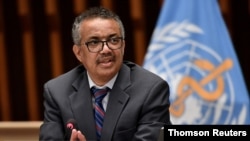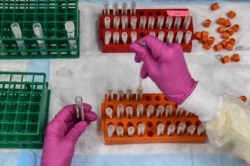The World Health Organization's director-general said Monday no crisis since World War II demonstrates more clearly the need for the United Nations than the COVID-19 pandemic. COVID-19 is the illness caused by the coronavirus.
Dr. Tedros Adhanom Ghebreyesus acknowledged the 75th anniversary of the United Nations as well as the start of the U.N. General Assembly this week, as he opened his regular briefing from WHO headquarters in Geneva.
Tedros said WHO, as "a proud member of the U.N. family," had three key messages for the U.N. members.
"First, the pandemic must motivate us to redouble our efforts to achieve the Sustainable Development Goals, not become an excuse for missing them; Second, we must prepare for the next pandemic now. And third, we must move heaven and Earth to ensure equitable access to diagnostics, therapeutics and vaccines," said WHO's director-general.
Tedros said from the very beginning, the WHO has been committed to global efforts to develop a COVID-19 vaccine and other treatments. Central to that effort, he said, was the partnership with the global vaccine alliance, GAVI, to establish the cooperative COVID-19 Vaccine Global Access (COVAX) facility, designed to ensure equitable access to any COVID-19 vaccine or treatments that maybe developed.
According to the Johns Hopkins University, which is tracking the global coronavirus pandemic, more than 31 million people are infected, and more than 961,000 people have died. The United States leads the world with more than 6.8 million infections and close to 200,000 deaths.
Meanwhile, nearly half of Americans, or 49%, said they definitely or probably would not get an inoculation if a coronavirus vaccine were available today, while 51% said they would, according to a Pew Research Center poll conducted earlier this month. Those who lean toward rejecting the inoculation have cited concerns about side effects.
President Donald Trump said last month the U.S. will have a vaccination for the coronavirus "before the end of the year or maybe even sooner." Experts say it can take decades to develop, test, and prove vaccines safe before they are administered to patients. Hope has been high, however, that a concerted international effort will produce an effective vaccine sometime next year.
Tedros said almost 200 potential COVID-19 vaccines are currently in clinical and pre-clinical testing through the cooperative effort.
"Our aim is to have 2 billion doses of vaccine available by the end of 2021," he said.
The director-general noted $3 billion has been invested so far, but $15 billion was needed immediately to maintain momentum and stay on track.
He said investing in COVAX only makes sense, saying it "will help to bring the pandemic under control, save lives, accelerate the economic recovery and ensure that the race for vaccines is a collaboration, not a contest. This is not charity, it's in every country's best interest. We sink or we swim together."
The WHO announced Monday 64 of the world’s top economies have now joined COVAX, with 38 other major economies indicating they will be joining in the coming days.






